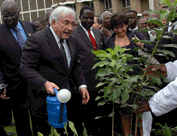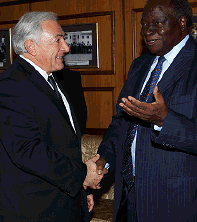
Typical street scene in Santa Ana, El Salvador. (Photo: iStock)
IMF Survey: Africa Seeing Signs of Recovery After Global Crisis—IMF
March 8, 2010
- Strauss-Kahn in third visit to Africa in 12 months
- Points to need to lay policy foundation for Africa's economic transformation
- Longer-term challenges include governance issues and climate change
With recovery getting under way, Africa should now address longer term challenges to the continent’s future, including governance issues and climate change, to be able to press ahead with the region’s economic transformation, IMF Managing Director Dominique Strauss-Kahn said.

Strauss-Kahn is on his third trip to Africa in 12 months. He pointed to climate change as a serious problem for developing countries. (photo: Steve Jaffe/IMF)
Post-crisis strategy
In a speech in Nairobi, Kenya, Strauss-Kahn assessed the impact of the global economic and financial crisis on Africa. While noting that the turbulence had struck Africa through many different channels, he said that “all across the continent, we can see signs of life, with rebounds in trade, export earnings, bank credit, and commercial activity.”
The IMF now expects growth of around 4½ percent in 2010. “In short, I think that Africa is back—although a lot depends on a global recovery that is in its early stages.”
The IMF chief is on a trip to Kenya, South Africa, and Zambia to meet political, business, and civil society leaders and assess the impact of the global economic and financial crisis on Africa.

Strauss-Kahn plants a tree at
Nairobi University.
(photo: Simon Willson/IMF)
“The twin challenges for Africa are to revive strong growth and reinforce resilience to shocks,” he stated in the speech on March 8 that set the scene for a panel discussion involving Kenya’s Prime Minister Raila Odinga, Finance Minister Uhuru Kenyatta, environmental activist and Nobel Prize winner Wangari Maathai, rock star and political activist Bob Geldof, and Transparency International’s Akere Muna.
The televised panel discussion took place in the University of Nairobi’s auditorium, where an audience of around 500 students, community leaders, and officials found standing room only. Moderator Charlayne Hunter-Gault put questions to the panelists that covered poverty relief, good governance, regional integration, intra-African trade, climate change financing, and the use of Africa’s natural resources. In the last half hour of the two-hour event, Hunter-Gault invited questions from students in the audience.
Improved policies
Strauss-Kahn said that because many African countries had undertaken good policies before the global economic crisis, this had helped to inoculate them against a more severe downturn—strengthening budget positions, reducing debt burdens, holding down inflation, and building comfortable reserve cushions. He noted that because debt positions had improved dramatically, many countries had been able to use the budget to counteract the crisis, including preserving social spending.
At the same time, Strauss-Kahn emphasized that there was no room for complacency regarding Africa’s economic outlook. “This is not the time to rest on our laurels,” he said. “Africa remains highly vulnerable to economic dislocation from many different sources. Think about swings in commodity prices, natural disasters, or instability in neighboring countries. Think about the risks that come from relying heavily on remittances, aid, and financial flows.”

Strauss-Kahn shakes hands with
Kenyan President Mwai Kibaki
in Nairobi
(photo: Steve Jaffe/IMF)
Twin challenges
Looking forward, he said the twin challenges for Africa are to revive strong growth and reinforce resilience to shocks.
“The first place to start is with macroeconomic policies,” the former French finance minister said.
“A major lesson from the crisis is that countries that sowed in times of plenty were able reap in times of loss. Policy buffers must therefore be rebuilt, to allow for future countercyclical responses, with fiscal policy and with reserves. Social safety nets must be strengthened—this is the first line of defense against adverse shocks. We should also beware that widening income inequality—across regions or segments of the population—can aggravate tensions and make shocks more destabilizing.”
Opening the event, Kenyan Finance Minister Uhuru Kenyatta said he recalled that, at a conference in Tanzania a year ago, Strauss-Kahn had committed the IMF to mobilizing the international community after the global financial crisis to ensure that Africa’s interests were not sidelined.
“We do note that indeed you have lived up to your commitment, because we have already begun to see some of the results, in terms of increased financial support from the IMF as well as other development partners. This, as well as reforms within the IMF, has gone a long way to helping us all weather the crisis and putting our economies back on the path to sustainable development. And for this we are grateful.”
Calls for change
Starting the debate session, Kenyan Prime Minister Raila Odinga called for change in the way the international economy is managed. “Fundamental reforms are required here, and I am happy that the IMF Managing Director has spearheaded the process of this reform.
“We have seen a departure from ‘one size fits all’ that was there in the past, so that the IMF is now relating more constructively with countries and also incorporating the specific properties of the economies of the Third World.”
Answering a question from the floor, Strauss-Kahn said “the new IMF” is trying to propose to Africans a new kind of partnership. “You need us but, certainly, the global economy needs you. So in the coming years, maybe in the coming months and weeks, we will be trying with you here in Kenya and in other countries in Africa, to build something new that will help you to help us.”
Help for developing world on climate change
Strauss-Kahn also drew attention to the challenge of climate change. He called upon the international community to marshal the resources needed to help developing countries, particularly low-income countries, address this issue—which he said could be “the shock to end all shocks.”
“Without action, Africa will suffer more from drought, flooding, food shortages, and disease—possibly provoking further instability and conflict,” he added.
While “some may rightly argue,” Strauss-Kahn said, “that climate change is not in the mandate of the IMF … the amount of resources needed has clear macroeconomic implications—sustainable growth in developing countries will require large-scale, long-term investments for climate change adaptation and mitigation.”
In this context, he said IMFstaff are working on the idea of a “Green Fund” with the capacity to raise $100 billion a year by 2020. He emphasized that while the IMF did not intend to manage such a fund, it aimed to offer something that “can make a significant contribution to the global debate and for consideration by the international community. And now is the time to put new ideas on the table.”
Acknowledging that launching such a scheme would entail a major political effort, he also said that the “potential pay-off is enormous—for Africa and the world.”
Comments on this article should be sent to imfsurvey@imf.org


